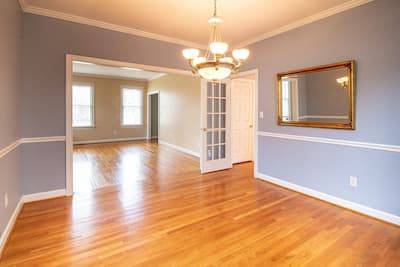Insurance for Landlords in Ontario
Do you rent out a residential property, such as a house, condo unit, vacation cottage or apartment building? Whether you have long-term renters or lease your summer home in the winter on Airbnb, it’s essential to have landlord insurance. Ontario homeowners who rent out their property need a comprehensive landlord policy to help protect their property from a range of insured perils that aren’t covered in a traditional homeowners policy.
Essentially, Ontario landlord insurance provides rental dwelling protection for property owners who rent their premises to others. You want to protect your rental property with the right landlord insurance as a landlord. Ontario insurance professionals recommend this coverage because not only will this help protect you financially in the event of an emergency caused by an insured peril, such as a fire or specific water damage, helping alleviate from costs and expenses of covered liability suits.
What Is Landlord Insurance?
Landlord insurance is a type of insurance that financially protects your rental property in the event of an insured loss or damage. These insured perils are usually listed in your insurance policy. If you have some coverage but aren’t sure precisely what is and is not covered by your landlord insurance, Ontario brokers at Morison Insurance are your best resource to get the information you need and the right landlord insurance coverage and to start a landlord insurance quote. It’s essential for individuals who lease properties to be aware of what protection is available to them in the event of an emergency. Losing your rental property can be devastating, both financially and emotionally. Protect yourself, and your investment, with the right insurance policy.
It’s important to note that, under a policy for landlord insurance in Canada, the building and property can be covered by landlord insurance. This includes certain personal belongings that the property owner may have on the premises, like major appliances and detached structures. Rental income and liability coverage are also protected through a landlord insurance policy.
Who Needs Landlord Insurance In Ontario?
If you own a property and plan to rent it to tenants, you should purchase landlord insurance to protect your asset and your financial stability. Sometimes, homeowners think that landlord insurance in Ontario is only for individuals who lease properties professionally—such as property managers who run apartment complexes. This is not the case. Even if you lease out a portion of your home, such as the bottom floor, as a secondary suite, you must ensure you’re adequately covered. Usually, when applying for property insurance, a question you’ll be asked if there are any boarders or rooms rented out and how many. Let your insurance broker know your living situation or if your dwelling’s occupancy has changed. Anytime you collect rent from a tenant or boarder, your insurance needs will differ from a typical homeowners policy.
Landlord insurance can be tailored to your unique needs as a rental property owner. Without it, you may be in severe financial trouble if you’re forced to rebuild or replace a damaged property entirely. Don’t let expenses come out of your own pocket for losses such as liability, property damage, or damage to your belongings.

Why Should I Get Landlord Insurance?
You should get landlord insurance to protect yourself from losses and claims that can arise while renting out your property. These can range from accidents that are out of your control to liability claims that can wind up dragging you to court. Many types of coverage—including liability insurance—are available in a landlord insurance policy offering various levels of protection to suit your needs.
If you, as a landlord, were to suffer a significant loss, you could face financial ruin if you had to repair or rebuild and pay the expenses from your own pocket. Landlord insurance is essential to protect your investment and avoid substantial financial harm in case of an insured peril or loss.
Many property owners don’t realize that it is possible to lose your property entirely to an insured peril, such as a fire and still be forced to pay the mortgage. Even though you no longer have a physical structure, you would still be required to keep up with your regular payments. Also, you would be responsible for rebuilding that structure on your own. As you may be faced with a loss of income from your tenant and could be exposed to liability lawsuits, this can make meeting mortgage payments nearly impossible without the financial protection of landlord insurance. Ontario property owners, landlord insurance is the simple way to avoid opening yourself up to financial ruin. Talk to our licensed and qualified insurance brokers today about a landlord insurance quote.
Is Landlord Insurance Required?
Landlord insurance in Ontario is not required by law, but purchasing this protection is wise. If you are not insured and suffer a loss, there may be considerable damages that you would be required to pay yourself. These expenses can add up quickly and may potentially far exceed your initial investment.
Suppose the property you own has a mortgage. In that case, it is very common for financial institutions to require insurance on the property when you purchase it and expect the insurance to be maintained. Since the lender has a financial interest in your property, it wants to ensure the property is adequately insured. The mortgage will likely be declined if the buyer cannot provide proof of insurance.
Even if you had to purchase rental property insurance upon buying the property, you may want to have a closer look at the policy’s details. There are different add-ons and extra coverages available to property owners that offer more protection than a standard policy. It’s up to the individual to ensure they know what is outlined in their insurance policy. That way, you are always prepared for the worst-case scenario. An insurance broker at Morison Insurance will be more than happy to walk you through what your policy does and does not include and help you find the best coverage for your needs.
Does My Homeowners Insurance Cover My Rental Property?
As mentioned earlier, your standard home insurance policy does not cover your rental property unless the location is listed and the exact type of rental occupancy is described.
All damages and losses, including liability claims associated with a rental property, would be denied without the appropriate coverage in place. This is because renting a property, whether a separate residence or a portion of your primary residence, increases exposure to cost. By having tenants, you open yourself up to more risk. This could include the risk of an incidental or unintentional fire started by your tenant’s curling iron left on overnight or the tenant damaging part of the property. For instance, if you’re not diligent about a snow and salt program with logs maintained, and your tenant slips and falls, injuring themselves in the process, you could find yourself at the start of a very long legal battle. Getting landlord home insurance is essential to insure your investment properly and protect yourself financially.

How Does Landlord Insurance Work?
Landlord insurance protects your rental investment and provides liability protection when you rent your property. While it’s not legally mandatory to have landlord insurance, Ontario landlords need this essential protection in case of insured losses. Should you need to make a claim, you have the reassurance that you can contact your insurance broker to start the claims process.
You will then have a claims professional to assist you, provide resources and the financial help to repair, replace or rebuild part or all of your property or defend a lawsuit.
When Should I Get Landlord Insurance?
You should start the process of getting landlord insurance when a seller accepts your purchase offer for a rental property so it can be ready to be put into effect on closing. Contact a Morison Insurance broker to learn more about rental insurance coverages.
Landlord insurance needs to be in place before the transfer of ownership. Typically, once an offer is accepted, you have weeks before the title is transferred if not months. Your insurance broker can adequately assess your insurance needs and determine your best coverage options. The broker will provide several rental property insurance quotes, and you can decide which insurance policy best meets your needs. If you acquire an investment property by succession or other means, contact your insurance broker as soon as possible.
Should you choose to use a second property, or part of the property you live in, as a rental property, then you need to acquire landlord insurance in Ontario before leasing the property. Your insurance policy must be in place before taking on tenants. If you are leasing the property and don’t have insurance and an unfortunate event or loss happens, you won’t be able to make a claim. It’s also important to note that acquiring insurance can be more challenging if you’ve been leasing your property without it.
What Coverages Does Insurance for Landlords Provide?
Landlord insurance can cover the physical damage to the dwelling and attached or detached structures, personal property such as major appliances, lawnmowers, and snow blowers included in the unit, liability coverage for lawsuits concerning the property ownership to include compensatory damages and legal costs, and loss of rental income. We’ve broken this down further in the following:
- Dwelling or Personal Property Coverage: Landlord insurance typically covers physical damage or loss to the property caused by specific acts of nature and/or a natural disaster such as wind, hail and fire. The policy will also cover damage to appliances owned by the landlord. When applying for landlord insurance, you must let your Morison Insurance broker know that you own the appliances and would like them protected in the policy.
- Vandalism and Theft: While not all insurance policies offer coverage for vandalism and theft in a basic policy, it’s important that you understand what is and is not covered by malicious intent. Burglars may take costly tools and equipment you need to maintain the property.
- Other Structures Coverage: It’s possible to protect other structures that are on the property through a landlord insurance policy. This can include structures such as a fence, greenhouse, shed or pool.
- Personal Property: Any personal items that you use on the property for maintenance or other uses can be included under a landlord insurance property. Examples of this would be a lawnmower or leaf blower.
- Loss of Rental Income: If your property is damaged due to an insured peril, say a fire, and it’s unfit for renters until repairs are completed, then your landlord insurance policy may reimburse you for the loss of rental income. Remember that you’ll only be indemnified up to the policy limits, as the expectation is that you will fix the property so that it can be safely leased once more. With this specific coverage built into landlord insurance, Ontario property owners can expect that the loss of income would be covered for a reasonable amount of time while the building or unit is repaired.
Additional Coverages
Several additional coverages are available to add to your standard landlord insurance policy. It’s also important to note that policies vary per insurance provider, so you’ll want to check that the above coverage examples are included in your unique policy. If not, inquire about add-ons. Some common add-ons that are highly beneficial to landlords include:
- Debris Removal: Should a covered natural disaster occur, and you need to pay for debris removal, say after a hurricane, this add-on will cover the costs.
- Protect Trees, Shrubs and Plants: Landscaping can be costly for property owners. If you have valuable trees, shrubs and other features as part of your landscaping, then you should inquire about adding a landscaping insurance policy to your landlord’s insurance policy.
- Collapse of Property: Should the property collapse due to an incident like a fire, you may be covered under a traditional landlord insurance policy. However, you may need additional coverage to protect your investment if a collapse occurs for another reason- such as an earthquake.
- Water and Flood Damage: Many standard landlord insurance policies do not cover different types of water damage and flooding. Inquire about add-ons to help protect your property from sewer back-ups and overland flooding.
- Vacancy Insurance: If your rental property is going to be vacant for more than 30 days, you need to notify your insurance broker immediately. Insurance options are available to ensure the property still has some coverage in your absence or any tenants’ absence. However, if you don’t notify your insurance broker, you will not be adequately covered in the event of an accident or other damage.
What Does Landlord Insurance Not Cover?
As comprehensive as your landlord insurance policy can be, it’s also essential to understand its limitations. Some of the standard landlord insurance policy exclusions include:
- Any personal belongings of the tenant: Landlord insurance is not renters insurance. While you need to protect yourself and your interests, it’s essential that you also require your tenants to have their own insurance. This will protect their personal property from a list of insured perils, such as a fire or theft.
- Wear and tear or building maintenance: A landlord insurance policy does not cover typical wear and tear. This is because wear and tear are natural over time, and it’s assumed that you, as the property owner, are doing everything you can to maintain the building properly.
- Damage or injury caused in part of business or farm use: Unless otherwise specified in your insurance policy, loss caused by commercial uses, such as a business operating out of your home or farm use (if you lease part of your farmyard to tenants) are not covered under a landlord insurance policy. Instead, inquire about what options you have to ensure you and your property are protected due to claims arising from commercial use.
- Any property illegally acquired (kept or stored): Under no circumstances will illegal property found on or stored at your rental unit be insured.
- Any loss occurring after the dwelling has been vacant for more than 30 consecutive days: As mentioned above, it’s integral to notify your insurance agent if your rental property is going to be vacant for more than 30 days. Otherwise, coverage on your policy will be null and void, and you will not be covered for any damage that may occur in your absence or the absence of any tenants.
- Intentional vandalism or damage by tenants: Unfortunately, your landlord’s insurance policy does not cover intentional damage. That’s why vetting your tenants as much as possible before signing a lease is essential. Usually, in the lease, there will be a clause outlining that damage needs to be repaired, or the costs will come from a damage deposit.
Each insurance company offers slightly different coverages, and additional landlord insurance coverages are available. This means insurance companies can provide landlord policies uniquely tailored to you. Note that along with these policies, unique exclusions are mandatory. A broker can review all the coverage exclusions and limitations with you to determine if you want additional coverage added to your rental home insurance policy.
An insurance broker will get you a landlord insurance quote tailored to your specific rental unit insurance needs and discuss optional coverage options with you to ensure you and your residential properties are properly protected.

What Landlord Insurance In Ontario Do I Need?
Since rental properties come in many forms, like detached dwellings, townhouses, condominiums, a duplex, triplex, or fourplexes, using the services of an insurance broker is the best option to select the appropriate landlord insurance for your specific needs and circumstances. An insurance broker will give you options to protect you and your rental property.
Rental Property Insurance For Detached Dwellings, Houses
If you own a property, the details of the construction of the dwelling and any other detached structures on the property must be considered when determining the amount of insurance required. If you update the rental property anytime, then it’s essential to let your Morison Insurance broker know. Renovations could result in increasing the property’s value. This may impact how much insurance you need to repair or replace the building should an accident happen.
Rental Property Insurance For Condominiums
If you are renting out a condominium you own, it is essential to determine what portion of the structure you own and are responsible for insuring. This can be determined by the “standard unit” definition, which is commonly provided to you by your condominium corporation board. It is crucial to know that any improvements made to the unit are always the unit owner’s responsibility to ensure. Any updates to the condominium will alter its value. In turn, this may impact what coverage you need. A condo landlord insurance policy will include specific coverages that are unique to a condominium, such as improvements and betterments, in addition to loss assessment coverage.
Rental Property Insurance For Vacant Properties
If you purchase a property that you plan to rent, but it is not occupied, or you are in-between tenants and want to make improvements before renting it, your property is considered vacant.
There is an increased risk exposure when a building is vacant, as no one is living at the residence to monitor it regularly. As such, some coverages are automatically removed during a vacancy.
In the interim, if the insurance company agrees, a vacancy permit will be applied to the policy, and further questions will need to be answered for the insurance provider to offer coverage. The company will request that a “vacancy questionnaire” be completed, which provides information the insurer needs to assess the situation, including what precautionary measures are in place while the premises are vacant. Once you find suitable tenants and they move into the unit, the vacancy permit can be lifted, and all eligible coverages can be reinstated.

How Much Does Landlord Insurance Cost?
The cost of landlord insurance depends on many factors. To determine the annual premium or your landlord insurance policy, the insurance company takes into consideration multiple factors, such as:
- Geographic location, including fire protection, proximity to water and the surrounding buildings.
- The size, condition, and age of the dwelling. Any improvements to the dwelling will also be reflected in the insurance costs.
- The number of rental units you have. Talk to your broker about how the number of units you lease impacts your insurance costs.
- The heat source within each unit. It’s important to note that rental units, such as a cottage, which include a wood-burning stove or fireplace, will be much more costly to insure because these heat sources are vastly more hazardous than a traditional HVAC unit.
- The type of coverage that the owner requests. Keep in mind that add-ons provide further protection, which may be reflected in the overall cost of your insurance policy.
- If the tenants are students, often, student residences come with additional risks, so it’s important to let your Morison Insurance broker know if your tenants are students.
- Is the property in compliance with all local bylaws and fire codes? If not, the insurance companies available to your broker and the coverage options may be further restricted.
How Much Renters Insurance Should A Landlord Require?
As a landlord, you want to protect your rental property investment. You can stipulate in your renter’s agreement that the tenant requires tenant insurance to rent the property.
A tenant’s insurance policy will protect the renter’s personal property and belongings and provide personal liability coverage for the tenant. This could alleviate additional liability exposure for you as the landlord if bodily injury or property damage were to occur. The average tenant policy requires a minimum liability limit of $1 million. The contents limit, which insures the individual’s belongings, can be more flexible concerning the amount of coverage required by the tenant.
Who Needs Renters Insurance?
Any person who occupies a residence they do not own should obtain renter’s insurance. Renter’s insurance provides personal liability coverage and coverage for the renter’s personal belongings. The cost of this coverage can be minimal, depending on the coverage limits requested and the applicant’s details.
It’s important to remember that who you choose to rent to and how you operate your rental can impact your risk exposures. For example, suppose you begin renting to students or boarders. In that case, your landlord insurance coverage needs may vary, so it’s crucial to ensure that you give your insurance broker all the applicable information to find the correct landlord insurance for your unique needs. As a landlord, it is a good idea to require that your tenants have renter’s insurance. Renter’s insurance is also called tenant’s insurance.
How Do I Get Landlord Insurance In Ontario?
Landlord insurance quotes are available through expert insurance brokers from Morison Insurance.
Working with a broker gives you extra peace of mind. You have an insurance expert helping you find the best coverage and competitive prices in the insurance market. At Morison Insurance, our focus is to ensure all our clients are completely satisfied and have the right protection for their needs.
Our Morison Insurance brokers know landlord insurance. Ontario policyholders can count on their broker to know what’s happening with their coverage because every Morison Insurance customer has a dedicated insurance broker—one specific insurance broker looking after your insurance. This way, we seek to build long-term relationships with all our clients. You’ll be at an advantage because we already know the details of your insurance needs and will work with you as your needs change. Your broker will answer your questions, make changes to your insurance if needed, and provide assistance and insurance service at any time.
If you’re ready to inquire about landlord insurance quote today, reach out to our licensed brokers at 1-800-463-8074. We look forward to helping you find the best coverage for your needs.
100+ Years
Online Reviews
Specialist Team
Clients Money

